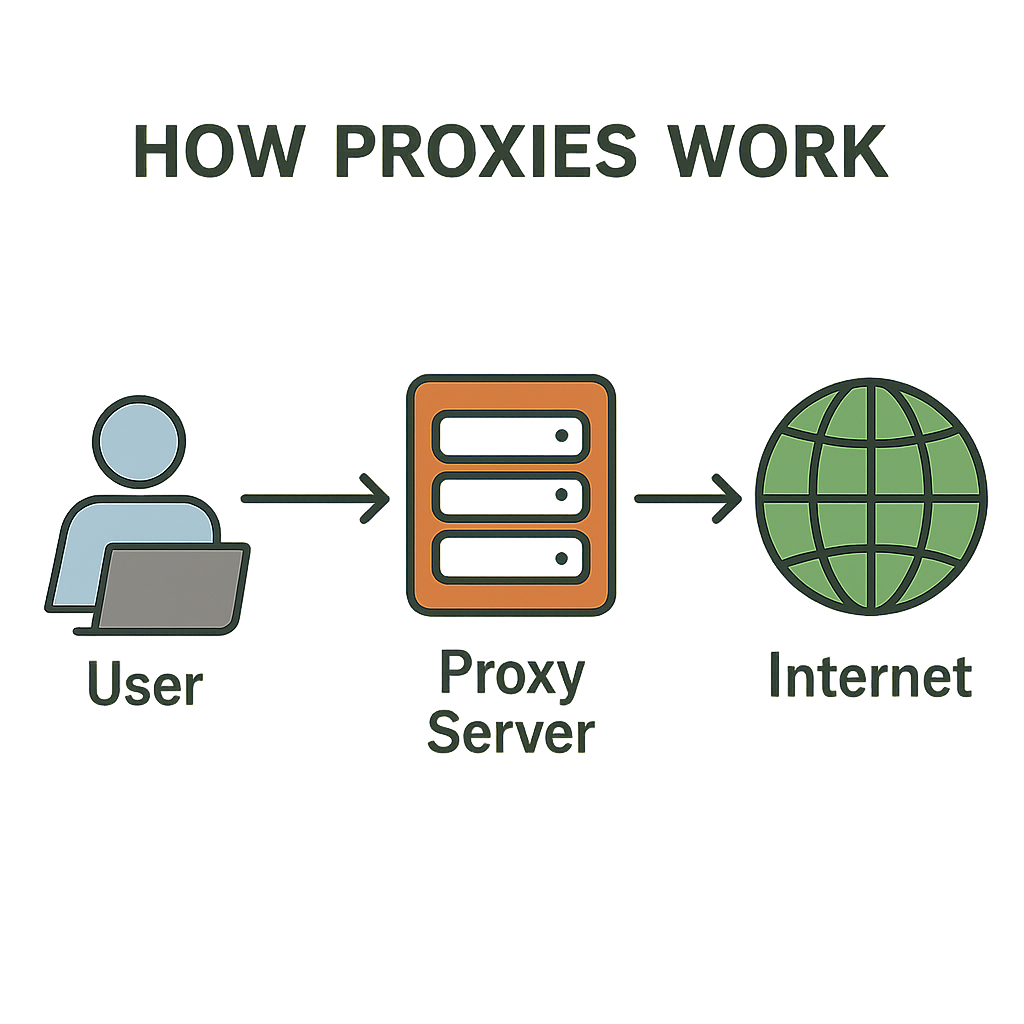Proxies are a hot topic in today's digital world. They serve as intermediaries, masking users' IP addresses for privacy.
But are proxies legal? This question often arises among internet users and IT professionals alike.
The legality of proxies can vary based on their use and regional laws. Understanding these nuances is crucial for responsible usage.
In this article, we will examine the legal framework surrounding proxies. We'll address common concerns and misconceptions, providing clarity on this complex subject.
Stay informed and make educated decisions about proxy use in your digital activities.
What Are Proxies and How Do They Work?
Proxies act as go-betweens, connecting your device to the internet. They help in masking your IP address, offering a layer of anonymity. This function can be vital for online privacy.
How Proxies Operate:
- Receive requests from your device
- Forward these requests to the internet
- Relay the response back to you

These steps help users access websites without revealing their IP address. This process can also enhance security by protecting against potential online threats.
Different types of proxies exist, each with unique functions. They vary from residential to mobile proxies, providing diverse levels of privacy and security. Understanding the basics of how proxies work is the first step in comprehending their legal implications.
Are Proxies Legal? A Global Perspective
The legality of proxies varies widely around the globe. In most regions, using proxies for legitimate activities is perfectly legal. These activities include enhancing privacy or accessing geo-restricted content.
However, legality depends on the purpose. Using proxies for illegal activities such as hacking or fraud is universally condemned. Each country establishes its laws concerning proxy use.
Common Legal Uses of Proxies:
- Enhance online privacy
- Access geo-restricted content
- Conduct competitive market analysis
Understanding local laws is crucial for proxy users. Some regions have lenient laws, while others enforce strict regulations. Violating these laws can result in severe consequences.
Therefore, before employing proxies, users should familiarize themselves with both local and international regulations. This knowledge helps in ensuring compliance and avoiding legal pitfalls.
Countries With Strict Proxy Regulations
Certain countries strictly regulate proxy use. These regulations often stem from concerns about data security and national security risks. Governments seek to control the flow of information.
Countries with Notable Proxy Restrictions:
- China
- Russia
- Iran
In these countries, using proxies without proper authorization can lead to severe penalties. Governments in such regions strive to protect their cyber ecosystems. Adapting to these laws is crucial for avoiding legal issues. Proxy users should stay informed about specific country restrictions to remain compliant and safeguard their online activities.
Legal vs. Illegal Uses of Proxies
The legality of proxy use primarily hinges on the intent behind it. Legitimate purposes often include activities that enhance online privacy or optimize performance. These uses are typically well within legal bounds.
However, proxies become illegal when used for harmful activities. Such actions include hacking, impersonating others, or bypassing lawful restrictions. Engaging in these activities can lead to severe legal repercussions.
Examples of Illegal Proxy Uses:
- Data theft
- Cyberstalking
- Fraudulent activities
Businesses often use proxies for web scraping or managing multiple accounts without legal issues. It's crucial to align proxy use with legal guidelines to ensure ethical behavior. Engaging in respectful and lawful proxy practices protects users from potential legal troubles while allowing them to enjoy the benefits of online anonymity.
Mobile Proxies: Special Considerations
Mobile proxies are increasingly popular for their ability to mimic real user behavior. They assign IP addresses from mobile devices, enhancing anonymity and bypassing geo-restrictions. This makes them ideal for use cases that require high levels of authenticity.
However, this type of proxy must be used responsibly to avoid illegal activities. Their dynamic nature and frequent IP changes can attract scrutiny if misused. Compliance with local laws and platform guidelines is essential to ensure legal proxy usage.
Key Considerations for Mobile Proxies:
- Ensure legitimate and ethical use
- Understand data privacy laws
- Choose reliable providers
By adhering to these guidelines, users can benefit from the unique features of mobile proxies while staying on the right side of the law.
Are MTG Proxies Legal? (Magic: The Gathering)
In the realm of Magic: The Gathering (MTG), proxies carry a different meaning. These are unofficial cards created to stand in for real ones during casual play. Enthusiasts often use them to preserve their valuable cards while still enjoying the game.
However, the legality and acceptance of MTG proxies in official settings remain contentious. While they are popular in friendly games, official tournaments strictly prohibit them. This distinction is crucial for players participating at different levels.
Key Points for MTG Proxies:
- Unofficial and not tournament-legal
- Common in casual play
- Preserve valuable originals
Understanding these dynamics helps players navigate the world of MTG responsibly, ensuring they enjoy both casual and competitive play within accepted rules.
Data Privacy, Security, and Ethical Proxy Use
Using proxies responsibly demands an awareness of data privacy and security. When utilized ethically, proxies can bolster online anonymity and protect sensitive information from prying eyes. This is particularly significant in an age where digital footprints are easily tracked.
However, not all proxy use is ethical or secure. Malicious activities undermine privacy principles, exposing users and organizations to legal repercussions. Thus, proxy users need to navigate this landscape mindfully.
Guidelines for Ethical Proxy Use:
- Understand and follow local laws and regulations.
- Avoid using proxies for illegal activities.
- Choose reputable providers that respect data privacy.
By adhering to these practices, individuals can leverage proxies to enhance their digital experience while respecting the boundaries of ethical use.
Best Practices for Using Proxies Legally
Navigating the legal landscape of proxies requires diligence and knowledge. To ensure lawful use, it's important to abide by some best practices. This can protect users from inadvertently crossing legal boundaries.
Being informed is a crucial step. Understand the terms of service and legal guidelines associated with your chosen proxy service. Awareness is key to staying within legal limits.
Legal Proxy Usage Tips:
- Choose proxies from reputable providers.
- Regularly update knowledge on data privacy laws.
- Use proxies for legitimate and ethical purposes only.
By following these tips, users can confidently make the most of proxies while staying compliant with the law.
Conclusion: Staying Informed and Responsible
Understanding the legality of proxy usage is more crucial than ever. As technology evolves, so do the laws and regulations surrounding it. Staying informed about both local and global legislation ensures that users remain compliant.
Being a responsible proxy user involves knowing the legal intricacies and ethical implications. By choosing ethical practices and reputable providers, individuals and businesses can harness the benefits of proxies without legal repercussions. Ultimately, informed use of proxies not only safeguards against legal issues but also promotes a safer and more responsible digital environment.
Frequently Asked Questions (FAQ)
1. What is a proxy server?
A proxy server is an intermediary server that forwards requests from clients seeking resources from other servers. It masks the user's IP address, providing a level of anonymity while browsing the internet.
2. Are all proxies legal?
Not all proxies are legal. The legality depends on the purpose for which they are used. Proxies used for legitimate activities, such as enhancing privacy, are typically legal. However, using proxies for illegal activities, such as hacking or fraud, is universally condemned.
3. What are mobile proxies?
Mobile proxies use IP addresses assigned to mobile devices. They offer higher levels of anonymity and can bypass geo-restrictions, making them suitable for tasks that require authentic user behavior.
4. Can I use MTG proxies in tournaments?
While MTG proxies are commonly accepted in casual play, they are typically not legal for use in official tournaments. It's important to check the tournament rules beforehand.
5. How can I ensure I use proxies legally?
To use proxies legally, familiarize yourself with local laws, choose reputable proxy services, and only use proxies for legitimate purposes. Staying informed about data privacy regulations is also crucial.
6. What are the risks of using proxies?
While proxies can enhance privacy, there are risks, including data breaches and potential legal issues. Using untrustworthy proxy services can lead to the exposure of sensitive information. Always choose reliable providers and understand local laws.
7. Which mobile proxy provider should I choose?
We recommend Aluvia—they offer a vast rotating mobile IP pool, affordable pricing, and expert support to keep your proxy connections fast, secure, and reliable.
Ready to use proxies responsibly?
Choose Aluvia today for seamless, compliant mobile proxy access and elevate your online privacy!








